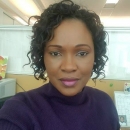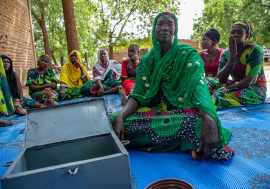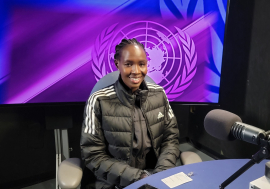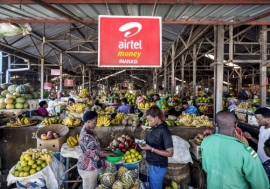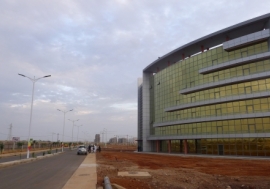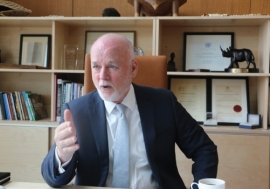How South Sudan’s ‘lost boy’ brought water to his village
How South Sudan’s ‘lost boy’ brought water to his village
Salva Dut was 11 years old, sitting through the last lesson in class and looking forward to the trip home with his schoolmates. Suddenly all hell broke loose. An infernal civil war had ignited in his native South Sudan. The year was 1985.
After a single gunshot, the teacher peeked outside, just as more gunshots rent the air. “Get down, lie on the floor,” the teacher cried out to the frightened pupils.
Rebels from southern Sudan had taken up arms against the government in the north in a war for independence. Suddenly it was no longer safe for the students to remain at school, and the teachers ordered them to run and hide in the bushes, because they knew their villages would be attacked soon.
This marked the beginning of a long odyssey for Salva and the other boys from Loun-Ariik village fleeing from war. He escaped before seeing his parents or knowing whether they were alive or not.
He joined a group of villagers from his Dinka ethnic group who walked for two months, with many succumbing to hunger, dehydration and famished wild animals along the way. Upon reaching neighbouring Ethiopia, they were sent to Itang refugee camp in the western part of the country. Salva was among some 20,000 children, mostly boys between 7 and 17 years of age, according to UNICEF, who were separated from their families during the war and ran into the bush and who came to be known as the “lost boys of Sudan”.
After six years at the Ethiopian refugee camp, it was time to move again. Salva led a group of 1,500 “lost boys” who walked hundreds of kilometres over 18 months, through the desert and across three countries, to reach Kakuma refugee camp in northern Kenya. Only 1,200 boys made it to Kenya. There Salva had the good fortune to get a sponsorship to travel to the United States in 1996.
In the United States, Salva was taken in by an American family and a church in Rochester, New York, who took him to school. All this time he kept wondering what had befallen his family back home. Since no one seemed to know their fate, he assumed they had died in the war.
One day Salva received a message from his cousin that his dad was very sick back home. He was a patient in a health centre supported by the UN.
“It was the first time in years to hear about a member of my family,” recalled Salva. “I was excited—even though my father was very ill, at least he was alive.” He travelled back home and was eventually reunited with his family.
He learned that his father had fallen sick from drinking dirty water. This triggered Salva’s resolve to help his village get clean water to drink. When he returned to the United States in 2003, he started Water for South Sudan (WSS), a nonprofit organization, together with his partner from the Nuer ethnic group, a rival of Salva’s Dinka group. Through the NGO, Salva raised funds and sank the first borehole in his village in 2005.
“The change was immediate. Women and girls no longer trekked for hours in unsafe terrain in search of water,” Salva told Africa Renewal.
Having seen how the project had transformed the lives of people in his village, Salva felt the need to do more. It costs from $8,000 to $15,000 to sink a borehole in South Sudan, and all the equipment is imported.
Back in the United States, Salva shared his story with friends, members of the Rochester church and others who contributed to his cause. He received small grants from various faith-based organizations, from Rotary International and from sales of a novel based on his life journey—A Long Walk to Water, a New York Times best-seller written by Linda Sue Park, which is read by seventh graders in American schools. Many students have contributed to the project.
“We have supporters in all 50 US states and in 33 other countries, among them Australia, Canada, Czech Republic, Italy, Japan, Malaysia, Mexico, Singapore, United Arab Emirates, and the United Kingdom, because of the book. Many international schools worldwide read it,” said Salva.
By March 2017 Salva’s organization had drilled 300 wells in South Sudan. Experts are involved in the project to ensure the boreholes are far enough apart to keep the water aquifers sustainable, usually not less than 100 miles. The borehole water is then treated and used for drinking, domestic use and watering cattle, but not for irrigation or other large-scale purposes.
For the project to be popularly accepted, Water for South Sudan involves local communities from the planning stages. To avoid conflicts, disagreements and misunderstandings, the organization also engages local leaders and elders to decide the location of future boreholes.
“We also train the villagers on how to operate the boreholes, and they are part of the committee that is charged with overseeing maintenance and repair of the equipment,” he said.
This year Salva’s team plans to drill up to 40 new boreholes in Waubaai County in Wau State and in Kuac North County in Gogrial State. They will focus more on schools and the new county headquarters in Payam.
Salva says that wherever the boreholes are sunk, schools and markets spring up, transforming the area and changing livelihoods. It is this kind of transformation that keeps Salva energized and the WSS project strong. A board of 14 directors in the United States, all volunteers, helps with strategic planning. The organization has three full-time and one part-time employee. Salva is based in South Sudan.
Lynn Malooly, who has been WSS executive director for the last seven years, says, “We are proud to be helping Salva and to be part of this.”
For the team, though, it has not been an easy ride. Transportation of borehole equipment from one part of the country to the other is often impeded by the frequent conflicts in South Sudan, as well as poor infrastructure.
“Oftentimes there are neither existing roads nor gas stations where we can refuel the trucks transporting the machines,” said Salva.
Extreme weather conditions, with temperatures rising up to a punishing 38°C, and the outbreak of malaria during the rainy season also affect the pace of the work, but do not stop it entirely.
Future plans
Salva plans to seek more partnerships to help many more people in South Sudan get access to clean drinking water. He hopes his water project will help foster peace and bring together the warring ethnic groups of Nuers and Dinkas for the sake of developing their country.
“We are one people no matter what. We have to work together. When I go back and see all these positive changes, I feel good. We are just planting a seed and you never know what that seed could turn out to be in the future,” he said.
At the end of the day, the “lost boy” of South Sudan has come home bearing gifts, and his people are grateful.

